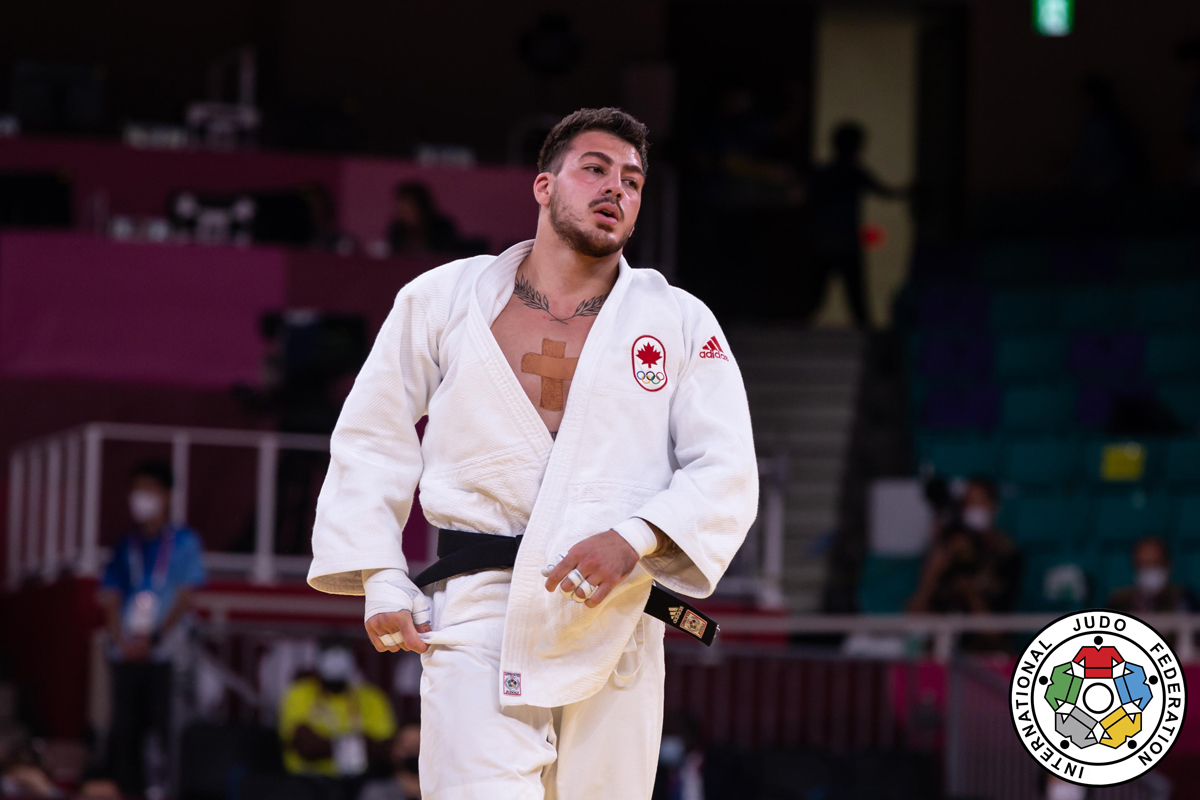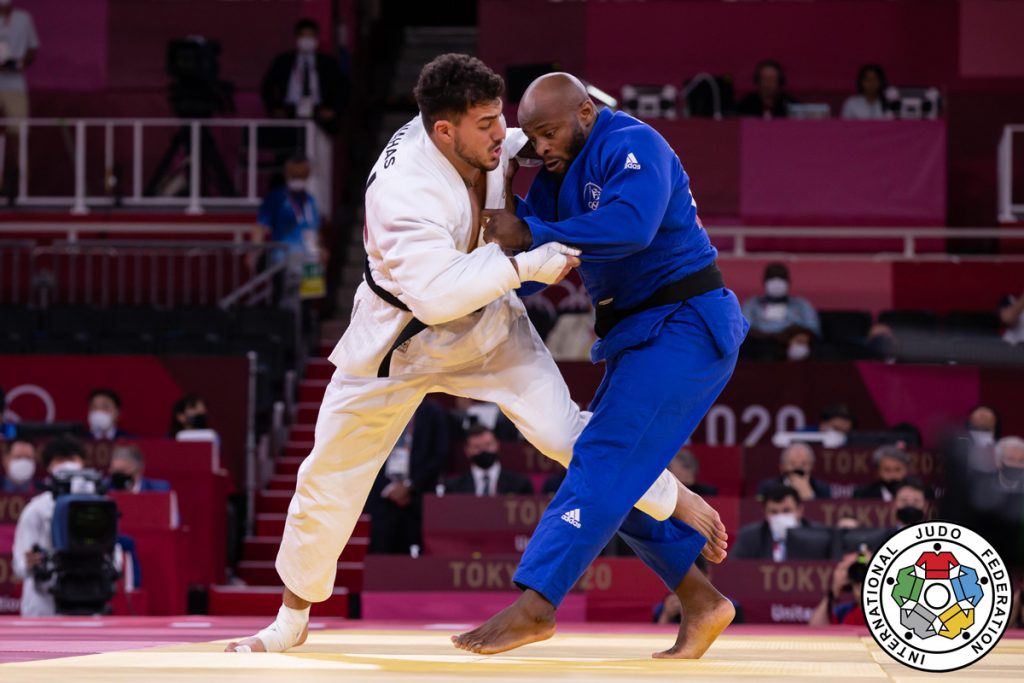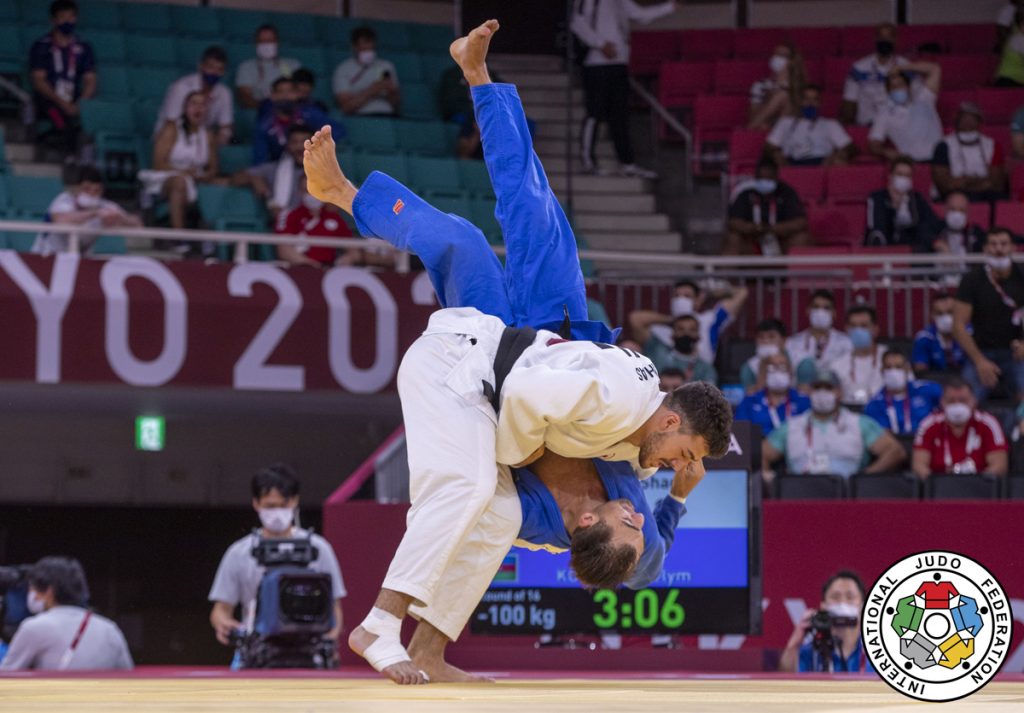Shady ElNahas retrouve le podium et son « mojo »
Montréal, 24 mars 2024 – Shady ElNahas a obtenu son premier podium de l’année 2024, dimanche, en raflant l’argent au tournoi des…
Judo Canada - Jeux olympiques de Tokyo

Shady Elnahas (photo Emanuele Di Feliciantonio, IJF)
Montréal, 29 juillet 2021 – Il s’en est fallu de bien peu pour qu’un troisième judoka canadien monte sur le podium des Jeux olympiques de Tokyo jeudi, alors que Shady Elnahas a accédé à un des deux combats pour les médailles de bronze dans la catégorie des moins de 100 kg. Après un rude combat où tous les espoirs étaient permis, le Torontois est arrivé tout juste à court de la victoire et s’est par conséquent classé cinquième.
Même s’il a connu un beau parcours au Japon, le jeune athlète de 23 ans, qui s’entraîne au centre national de Judo Canada à Montréal depuis quatre ans, n’avait pas le cœur à la fête. « Je ne suis pas du tout satisfait! Je suis venu ici pour gagner l’or et j’y croyais. Je me sentais prêt mentalement et physiquement. Malheureusement, ce n’est pas arrivé. »
Celui qui en était à sa première expérience olympique était très calme sur les tatamis. « À chaque tournoi, je veux la médaille d’or, alors je suis dans le même état d’esprit chaque fois. Honnêtement, c’est seulement lors du combat de la médaille de bronze où là, je me suis dit : Wow, je suis aux Jeux! Avant ça, c’était comme n’importe quelle compétition, je voulais simplement gagner. »
Dans son duel pour le bronze, Elnahas, huitième au monde, a offert toute une opposition au Portugais Jorge Fonseca, deuxième au classement international et double champion mondial en titre de la catégorie. Il a réussi à bien placer ses mains à plusieurs occasions, sans toutefois réussir à en profiter. Avec une trentaine de secondes à faire, son adversaire a marqué waza-ari.
Même si le Portugais a écopé d’une deuxième pénalité par la suite, l’Ontarien n’a pas été en mesure de combler l’écart, malgré de nombreuses tentatives d’attaques.
« La plupart du temps j’étais en contrôle et je voyais qu’il se fatiguait beaucoup plus rapidement que moi. Ça m’a peut-être un peu trop excité, j’ai attaqué et il m’a marqué waza-ari. J’étais un peu sous le choc et je n’ai pas pu me rattraper », a expliqué celui qui avait déjà battu Fonseca deux fois par le passé, mais s’était incliné lors de leur plus récent affrontement au repêchage du Tournoi des maîtres, en janvier.
Elnahas a eu la chance de se battre pour une médaille grâce à sa victoire au repêchage contre l’Israélien Peter Paltchik, quatrième mondial. Dans un combat serré et épuisant, il a marqué ippon en prolongation (golden score), réussissant o-uchi-gari, un grand fauchage intérieur.
« Paltchik est un des meilleurs au monde. Je savais que ça allait être long avant de gagner ce combat, qui a été tactique. C’était la troisième fois que nous nous battions l’un contre l’autre et je savais quoi faire cette fois », a résumé le Canadien, qui a maintenant gagné deux de ses trois duels face à l’Israélien.

Deux premières victoires par ippon
Elnahas a bien commencé sa journée, obtenant un ippon contre Ivan Remarenco des Émirats arabes unis dans les seizièmes de finale. Il a marqué waza-ari, puis a enchaîné avec une immobilisation en prenant la jambe gauche de son adversaire dans la deuxième minute du temps réglementaire.
En huitièmes de finale, contre l’Azerbaïdjanais Zelym Kotsoiev, neuvième au monde, le Torontois a réussi une projection pour waza-ari après une trentaine de secondes. Il pensait bien l’avoir emporté grâce à la même technique avant la fin de la première minute, mais, bizarrement, les arbitres ne lui ont pas accordé le point alors que son exécution était quasi identique à la première. Il a finalement réussi un o-uchi-gari avec moins d’une minute pour marquer ippon.
« Je ne me suis pas rendu compte que l’arbitre a enlevé mon waza-ari jusqu’à ce que je vois Sasha (Mehmedovic), mon entraîneur, demander ce qui arrivait. Moi aussi, j’étais vraiment surpris qu’ils m’enlèvent mon waza-ari. C’était un peu frustrant, car chaque minute de combat demande beaucoup d’énergie. Je pense encore que c’en était un, mais au final, ce sont les arbitres qui décident. »
C’est le Géorgien Varlam Liparteliani qui a freiné Elnahas dans les quarts de finale. Le numéro un mondial et vice-champion olympique à Rio a marqué waza-ari dans la deuxième minute lors d’un enchaînement d’attaques, puis encore à trois secondes de la fin pour ippon.
« C’était un athlète que je regardais quand j’avais 12 ans. Depuis 2012, c’est un des tops. Je savais donc comment il se bat. Je pense que j’ai bloqué toutes les techniques qu’il a l’habitude de faire. Il est un de ceux qui coupent le plus de poids dans ma division. Il a utilisé son poids pour être défensif et a bien géré le combat. Je pense que je peux le battre, mais c’était la première fois que je l’affrontais. »
Le titre olympique des Jeux de Tokyo est revenu au Japonais Aaron Wolf, tombeur de Liparteliani dans les demi-finales, qui a vaincu le Sud-Coréen Guham Cho en grande finale. Niiaz Iliasov, athlète du comité olympique russe, a obtenu l’autre médaille de bronze.
Elnahas se concentrera maintenant sur le cycle des Jeux de Paris. « Je ne vais pas arrêter le judo avant d’avoir une médaille olympique. Même si j’ai 50 ans, je vais essayer d’avoir cette médaille », a conclu le double champion panaméricain en titre.
Des Jeux exceptionnels pour le judo canadien
Rappelons que ces Jeux passeront à l’histoire pour le judo canadien, qui a vu deux de ses représentantes mettre la main sur des médailles lors d’une même olympiade, une première. Jessica Klimkait, chez les moins de 57 kg, et Catherine Beauchemin-Pinard, du côté des moins de 63 kg, sont en effet montées sur la troisième marche du podium au Japon.
Un peu comme Elnahas, Arthur Margelidon est passé bien près également d’être médaillé olympique, se classant cinquième dans la catégorie des moins de 73 kg.
Antoine Valois-Fortier, défait à son deuxième duel chez les moins de 81 kg, et Ecaterina Guica, qui s’est inclinée à sa première sortie du côté des moins de 52 kg, faisaient aussi partie de la puissante délégation de Judo Canada dans la capitale japonaise.
-30-
Rédigé par Sportcom pour Judo Canada
Source :
Patrick Esparbès
Directeur général adjoint
Judo Canada
(514) 668-6279
p.esparbes@judocanada.org

Montréal, July 29, 2021 – A third Canadian judoka came close to stepping onto the podium at the Tokyo Olympic Games on Thursday as Shady El Nahas advanced to one of the two bronze medal finals in the under-100 kg category. At the end of a tough battle, however, the Torontonian came up just short of victory and consequently finished fifth, dashing his high hopes.
Although he had a very good run in Japan, the 23-year-old, who has been training at Judo Canada’s National Training Centre in Montréal for the past four years, was not in the mood to celebrate. “I’m not satisfied at all! I came here to win, and I believed that I could. I felt ready both mentally and physically. Unfortunately, that’s not what happened.”
The first-time Olympian was very calm on the tatamis. “At every tournament, I want to win gold, so I’m always in the same headspace. Honestly, it was only when I got to the bronze medal match that I thought to myself, ‘Wow, I’m at the Olympics!’ Up until that point, it was like any other competition. I just wanted to win.”
In his fight for bronze, El Nahas, who is ranked eighth in the world, put up quite a fight against Portugal’s Jorge Fonseca, second in the international rankings and two-time defending world champion in the weight class. On several occasions, he managed to position his hands well, but was unable to score. With about thirty seconds to go, his opponent scored a waza-ari.
Although Fonseca received a second penalty afterwards, El Nahas was unable to close the gap, despite numerous attempted attacks.
“I was in control for most of the fight, and I could see that he was getting tired more quickly that I was. Maybe I got a little too excited about that. I attacked and he scored the waza-ari. I was a little shocked and wasn’t able to catch up afterwards,” said the Ontarian, who has beaten Fonseca twice in the past but lost their most recent match-up in the Masters Tournament repechage in January.
El Nahas had advanced to the bronze medal round after winning his repechage match against Israel’s Peter Paltchik, who is currently ranked fourth internationally. In a tight and exhausting fight, he scored an ippon in Golden Score (overtime), landing an ouchi-gari, or major inner reaping throw.
“Paltchik is one of the best in the world. I knew it was going to take a long time to win that fight, which was quite tactical. It was the third time we fought each other and this time, I knew what I had to do,” said the Canadian, who has now won two of his three duels against the Israeli.
Two Early Victories by Ippon
El Nahas had a great start to his day, clinching an ippon against Ivan Remarenco of the United Arab Emirates in the round of 32. He scored a waza-ari, then followed up with a hold on his opponent’s left leg in the second minute of regulation time.
In the round of 16, the Canadian completed a throw for a waza-ari about 30 seconds into his match against Azerbaijan’s Zelym Kotsoiev, who is ranked ninth in the world. After a second, almost identical throw, he thought he had won the bout, but in a strange and surprising turn of events, the referees did not award him the point. In the final minute, he landed another ouchi-gari to score ippon.
“I didn’t realize they had taken away my waza-ari until I saw my coach Sasha (Mehmedovic) ask what was going on. I too was really surprised they took away my waza-ari. It was a bit frustrating because every minute of a fight takes a lot of energy. I still think it should have counted, but it’s the refs who decide.”
In the quarter-final, Georgia’s Varlam Liparteliani was the one to put the brakes on El Nahas’ run. The number one ranked judoka in the world and Olympic runner-up in Rio scored a waza-ari in the second minute during a sequence of attacks, and then again with three seconds left, earning himself an ippon.
“I used to watch him when I was 12 years old. He’s been one of the best since 2012. So I know how he fights. I think I managed to block all his usual techniques. He’s one of the ones who drops the most weight in my division. He used his weight defensively and managed the fight well. I think I could beat him, but this was my first time facing him.”
The Tokyo Olympic title went to Japan’s Aaron Wolf, who defeated Liparteliani in the semi-final and South Korea’s Guham Cho in the gold medal final. Niiaz Iliasov, of the Russian Olympic Committee, won the other bronze medal.
El Nahas now has his sights set on the Paris Games. “I don’t plan to stop competing in judo until I have an Olympic medal. Even if I’m 50 years old, I’m going to go for that medal,” concluded the two-time defending Pan-American champion.
Exceptional Olympic Games for Canada’s Judoka
The Tokyo Olympics will go down in history for Canadian judo. For the first time, Canada claimed two judo medals at the same Games. Jessica Klimkait (under-57 kg) and Catherine Beauchemin-Pinard (under-63 kg) both earned bronze medals in Japan.
Like his teammate El Nahas, Arthur Margelidon also came close to claiming an Olympic medal, placing fifth in the under-73 kg category.
Antoine Valois-Fortier, who lost his second clash in the under-81 kg class, and Ecaterina Guica, who was eliminated after her first bout in the under-52 kg group, were also members of Judo Canada’s strong delegation to the Japanese capital.
-30-
Written Sportcom for Judo Canada
Source:
Patrick Esparbès
Chief Operating Officer
Judo Canada
(514) 668-6279
p.esparbes@judocanada.org
Montréal, 24 mars 2024 – Shady ElNahas a obtenu son premier podium de l’année 2024, dimanche, en raflant l’argent au tournoi des…
Montréal, 28 mars 2024 (Judo Canada) – Ceinture noire ou non, ce n’est pas ce qui allait freiner la volonté de Ruth…
Montréal, 30 mars 2024 (Judo Canada) – François Gauthier-Drapeau a mis la main sur la deuxième médaille de l’équipe canadienne au Grand…
Montréal, 31 mars 2024 – L’Ontarien Shady ElNahas a procuré une troisième médaille au Canada au dernier jour du Grand Chelem de…